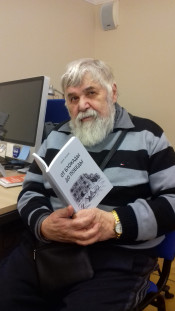
The Presidential Library tells about three evacuations of a resident of besieged Leningrad
A short but very comprehensive book “From the Siege to the Victory” was handed over to the Presidential Library to be digitized. Its author is Ivan Ilyin, resident of besieged Leningrad, the son of the regiment on the Leningrad front, later a full member of the Russian Geographical Society, a full member of the St. Petersburg Nobility Assembly.
At the beginning of the siege, the boy was 10 years old. He met the war at the country house in Strelna, then he lived in the besieged city, at the front under Kolpino, evacuation in March 1942, the death of his younger brother ... Despite all the tragedy of the events described, the book is read in one breath. The publication as part of the campaign to preserve the memory of the siege of Leningrad, announced at the end of last year, was handed over to the Presidential Library by the 87-year-old author himself.
In the life of Ivan Dmitrievich during the war years there was not one, but ... three evacuations. The story about this deserves special attention. “We reached the village of Kobona on the other side of Ladoga, where a huge amount of cargo had accumulated for besieged Leningrad. It was a Big land! <...> While mom went to get groceries, I stayed with my brother Vovka. My mother returned, but we did not have time to eat anything, as the landing in the train was announced”, - recalls Ilyin.
During the crush when landing our food was stolen by somebody... Mom suffered a heart attack from frustration and she lost consciousness. Later my little brother died. Mother came to her senses.
“Meanwhile, in the southern night sky, from the western side, flashes of explosions of the approaching front began to appear. We started to gather things again ... ”, - Ivan Dmitrievich shares childhood memories.
This was the second evacuation. We gathered things for half a day. But ... at the station Tikhoretskaya the train was bombed. “The first wagons remaining intact were attached to some train and transferred to the town of Stupino, which is not far from Kashira”, - he continues.
Leningraders were settled in two-story barracks. In September 1942, Ivan, like some of the other Leningrad children, was not able to go to school, because he grew out of old clothes, and there was nothing to buy new. Then the cold and hunger came. The family was forced to go further - to relatives in Turkmenistan, in Ashgabat . Thus began the third "evacuation".
We were not able to find relatives in Ashgabat, and a man Kurban-Baba sheltered Ivan with his mother, who did not have either money or a roof over their heads. Leningraders lived in a huge family of hospitable Turkmen. “How many women and children were in the yard, I could not count them, although we lived in this family for more than a year...”, - recalls Ilyin.
Young Ivan made friends with the Turkmen who sheltered the citizens of Leningrad, and learned his story: until the end of the 20s, Kurban-Baba led a nomadic life, saw a lot, but then settled in his native land.
Ivan Ilyin himself received the nickname Leningrad in the Turkmen courtyard, because he often talked about his hometown, surrounded by the enemy's ring, the distant front ... These are the different people and destinies intertwined during the evacuation.
Earlier, as part of the campaign to preserve the memory of the everyday life of besieged Leningrad, announced at the end of last year, the Presidential Library wrote about the diary of siege survivor in which Veniamin Kaverin, the famous Soviet writer and author of Two Captains became interested. The Presidential Library’s specialists also received materials on the inventor who, during the war years, introduced innovations in porcelain production, on young firefighters in the besieged city, on the horrors of war through the eyes of artists, etc.
In total, about 200 people responded to the call of the Presidential Library to share testimonies about that difficult time and the Presidential Library already digitized about 2,000 archival documents.

